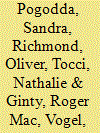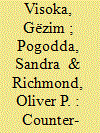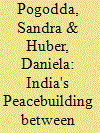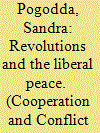|
|
|
Sort Order |
|
|
|
Items / Page
|
|
|
|
|
|
|
| Srl | Item |
| 1 |
ID:
131624


|
|
|
|
|
| Publication |
2014.
|
| Summary/Abstract |
European Union (EU) interventions in conflict countries tend to focus on governance reforms of political and economic frameworks instead of the geopolitical context or the underlying power asymmetries that fuel conflict. They follow a liberal pattern often associated with northern donors and the UN system more generally. The EU's approach diverges from prevalent governance paradigms mainly in its engagement with social, identity and socio-economic exclusion. This article examines the EU's 'peace-as-governance' model in Cyprus, Georgia, Palestine and Bosnia and Herzegovina. These cases indicate that a tense and contradictory strategic situation may arise from an insufficient redress of underlying conflict issues.
|
|
|
|
|
|
|
|
|
|
|
|
|
|
|
|
| 2 |
ID:
192318


|
|
|
|
|
| Summary/Abstract |
In the face of the current decline or spectacular collapse of peace processes, this article investigates whether peace has become systematically blocked. It investigates whether the ineffectiveness of an ‘international peace architecture’ (IPA) can be explained by a more potent counterpeace system, which is growing in its shadow. It identifies counterpeace as proto-systemic processes that connect spoilers across all scales (local, regional, national, transnational), while exploiting structural blockages to peace and unintended consequences of peace interventions. It elaborates three distinct patterns of blockages to peace in contemporary conflicts across the globe: the stalemate, limited counterpeace, and unmitigated counterpeace. Drawing on the counterrevolution literature, this research asks: Have peace interventions become the source of their own undoing? Which factors consolidate or aggravate emerging conflict patterns? Are blockages to peace systemic enough to construct a sedimentary and layered counterpeace edifice?
|
|
|
|
|
|
|
|
|
|
|
|
|
|
|
|
| 3 |
ID:
134780


|
|
|
|
|
| Summary/Abstract |
This paper analyses India's internal peacebuilding approach in Bihar, north-east India and Jammu and Kashmir regarding its similarity with the liberal peace and its effectiveness in terms of conflict transformation. By focusing on the human rights and needs components of Indian peacebuilding, we investigate whether state interventions have managed to transform the local conflict spheres in their political, economic, societal and gender/family dimensions. Drawing on fieldwork carried out between 2011 and 2013, the paper remains sceptical about both the novelty and effectiveness of the Indian peacebuilding approach.
|
|
|
|
|
|
|
|
|
|
|
|
|
|
|
|
| 4 |
ID:
139232


|
|
|
|
|
| Summary/Abstract |
With Palestine gaining increasing international recognition for its sovereignty aspirations, this paper investigates the ongoing Palestinian state-formation process. It examines how far grassroots movements, domestic political leaderships and international actors have promoted or undermined intra-Palestinian unity and societal consensus around the rules, design and extent of a future Palestinian state. The paper introduces the novel concept of everyday state formation as a crucial form of grassroots agency in this process. Moreover, it illustrates the internal tensions of contemporary statebuilding: without reconciliation across multiple scales – local to global – the complex interactions of structural, governmental and subaltern power tend to build societal fragility into emerging state structures.
|
|
|
|
|
|
|
|
|
|
|
|
|
|
|
|
| 5 |
ID:
174710


|
|
|
|
|
| Summary/Abstract |
This article explores the relationship between contemporary revolutionary agency, domestic reforms and liberal peacebuilding in the aftermath of the Arab Uprisings. In particular, it focuses on the tensions between the liberal peace’s orthodox and emancipatory strands by asking: Does liberal peacebuilding support or hinder revolutionary emancipation in the Arab region? The article aims to close a gap in PCS scholarship by delivering insights into contemporary revolutionary processes (here called ‘everyday state formation’). After elaborating the disjunctures between revolutionary agency and liberal peacebuilding interventions in the spheres of statebuilding, development and democratisation, many peacebuilding interventions appear as counterrevolutionary practices.
|
|
|
|
|
|
|
|
|
|
|
|
|
|
|
|
|
|
|
|
|